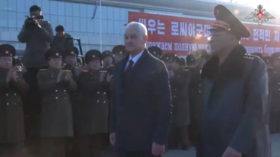The treaty of “indefinite” limits includes pledges by the two nations to assist one another in case either faces an armed attack
The Comprehensive Strategic Partnership Agreement between Russia and North Korea came into force on Wednesday after an exchange of ratification documents in Moscow. The “indefinite” treaty, signed by President Vladimir Putin and North Korean leader Kim Jong-un in June, signals closer cooperation between the two nations amid heightened global tensions.
The agreement provides for mutual military assistance in the event of an attack, pledging immediate support “by all means available” under Article 51 of the UN Charter. It also outlines commitments to economic, technological, and defense collaboration.
The pact, which replaces a friendship treaty signed in 2000, underscores the intention of Moscow and Pyongyang to resist Western dominance and push for a multipolar global order. It also bans either party from allowing third countries to use their territories in ways that undermine the other’s security.
The neighboring countries, which share a land border about ten miles long, had ratified the treaty in November. On Wednesday in Moscow, their respective Deputy Foreign Ministers Andrey Rudenko and Kim Jong-gyu signed a protocol that marked its official activation.
The Russian Foreign Ministry described the deal as a “stabilizing contribution” to the security of Northeast Asia and the Asia-Pacific region as a whole, aimed at ensuring regional peace and at “building a new, just, multipolar world.”
The treaty comes as South Korea and the United States have expressed concern over strengthening ties between Moscow and Pyongyang. Seoul has warned of potential retaliation, including arms supplies to Ukraine, if Russia transfers military technology to North Korea.
The commencement of the agreement also follows claims by Washington and its allies that Pyongyang had sent some 12,000 troops to Russia for training, and for possible deployment in the Ukraine conflict. Moscow and Pyongyang have neither confirmed nor denied the reports. Vladimir Putin had earlier said that it was up to the two nations to decide how they fulfil their mutual commitments under the new treaty.
The pact also strengthens cooperation across key areas, including space exploration, nuclear energy, and defense. Joint initiatives will also target economic zones, food and energy security, as well as advancements in artificial intelligence and biotechnology. It has also created mechanisms to boost military readiness, with the aim of deterring conflicts in the region.
You can share this story on social media:




